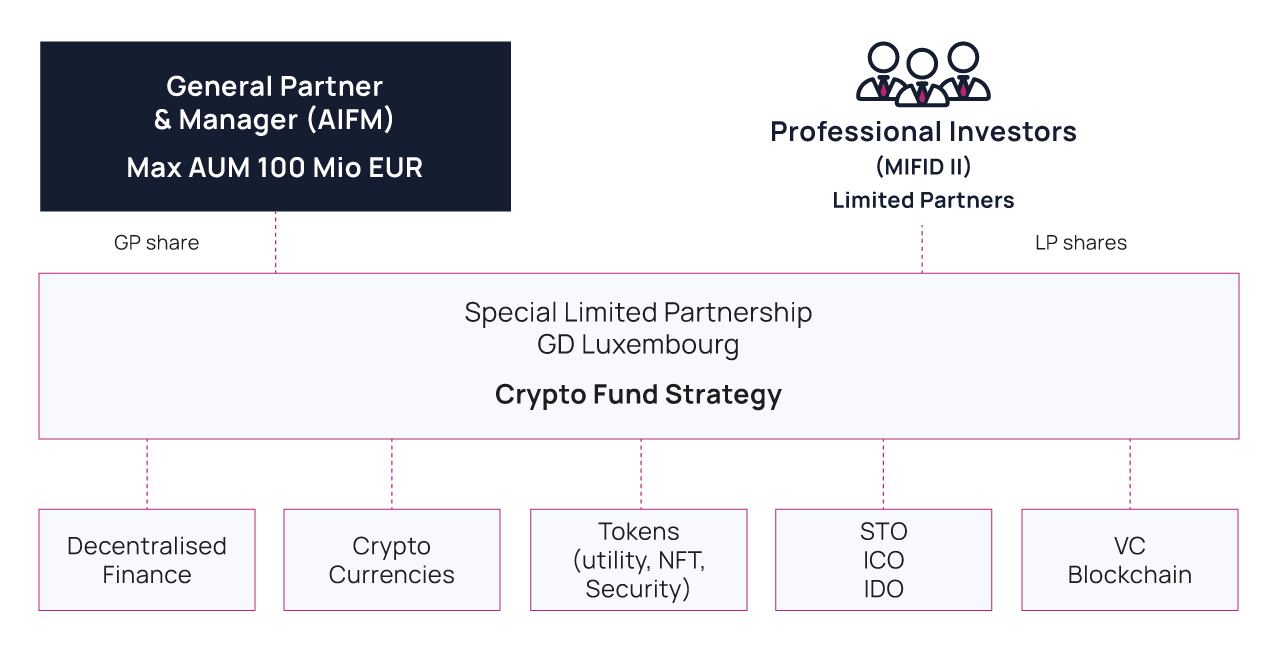The SLP/SCSp to setup a Crypto Fund as an Alternative Investment Fund
In the recent years, the rise of crypto or digital assets has significantly shaken the financial markets to become one of the most popular type of assets and leading to a new revolution in terms of investment strategies.
One of the main reason for this development is due to the decentralised nature of such assets which is really attractive to professionals investors.
This is further enhanced by the various advantages of the blockchain capabilities (transparency, fluid transactions, flexibility) as well as the variety in terms of financial instruments (tokens, crypto currencies, ect..) available for the managers and their investors to choose from.
As a matter of fact, any type of asset can be “tokenised” :
-
A security, (bonds, shares, funds, warrant, options, etc)
-
A currency, (or a cryptocurrency)
-
A movable asset, (car, plane, boat, etc)
-
An intellectual property right or even real estate.
Over the years, Luxembourg has become a leading jurisdiction when it comes to crypto assets due to the constant overview and various regulations from the CSSF (Fund regulator) with the intend to provide a clear visibility for the managers and facilitate the creation of dedicated structures for these type of assets.
The Special Limited Partnership (SLP / SCSp ) for instance can be considered as the optimal solution in regards to the setup of a crypto fund in Luxembourg due to its flexibility to accommodate any kind of crypto strategy including:
Furthermore, the manager of a SLP as registered AIFM (under 100 Mio EUR AUM) does not need to obtain a prior authorisation from the CSSF for the Crypto Fund strategy nor does he need to complete an application file for registration as a virtual asset service provider (“VASP”). The process is limited to a registration with the CSSF.
Thanks to the above, the SLP remains the best structure in terms of speed to market for crypto strategy with an average setup of a couple of weeks.

Security Token Offering Process
The Security Token Offering (STO) has initially replaced the Initial Coin Offering (ICO) and represent the issuance of a security token in order to raise funds from investors which will receive in return dividends, interest rates, staking rewards or additional tokens in the company.
Security tokens are smart contracts linked to different type of underlying assets including equity and debt financial instruments as well as funds and also real estate investment trusts.
Security token have more credibility than their crypto counterparts since they have to pass a Howey's Test, which was developed by the US Supreme Court in order to assess if a transaction could be considered as a form of investment contract.
Whether a certain investment is considered a security is important, because designation as a security means that the investment is subject to certain registration requirements.
In general, all securities offered in the public must be approved by a financial regulator, although there are some exceptions (for professional clients for example, when the notes have a value of more than 100 000 Eur,etc)
A company offering tokens which are considered as security tokens has to follow the same rules as if it was issuing securities (shares or notes).
A token is usually considered as a security token using the Howey Test, ie a transaction is an investment contract if:
1.It is an investment of money
2.There is an expectation of profits from the investment
3.The investment of money is commingled into one enterprise
4.Any profits is derived from the efforts of a promoter or manager
Utility tokens are not security token as they are related to a provision of services.
BLOCKCHAIN TECHNOLOGY
Blockchain is the first radical technology innovation of the 21st century. It provides a secure ledger system which is distributed across various network participants. This provides a highly secure accountancy system which is hardened against unauthorised use and advantages as:
Security: Blockchain aims at increasing the security of the system from hacking and fraud.
Easy to use : It provides an easy mechanism to allow users to securely transfer the currencies or assets between them and facilitates easy audit of user accounts.
Flexibility: Using a blockchain technology does not mean that the system will need to be a public ledger or open system if this is undesirable. It can be restricted to some users.
Privacy: The system may remain totally private if desirable. There are key differences between public and private blockchains .
Accounting : Blockchain provides a powerful accounting/auditing layer.
Malleable technology: Blockchain assets are currently unregulated, helping minimize management costs and expand the possible user base and distribution channels.
Any Assets can be placed on Blockchain :
-
a security, (bonds, shares, funds, warrant, options, etc)
-
a currency, (or a crypto currency)
-
a movable asset, (car, plane, boat, etc)
-
an intellectual property right or even
-
real estate.
They can all be held by a securitisation Special Purpose Vehicle. (SPV)
This SPV can then issue “Token” which is a debt security which can be traded in a blockchain (private or public).
Once the Token is issued it can be traded on a stock exchange or transferred to any participant to this exchange.
Creatrust services include:
-
Fund setup and incorporation
-
Structuring
-
Request of an ISIN number
-
Fund Administration services
-
N.A.V Calculation
-
AML/KYC and reporting
-
Access to our platform FundNav.lu
Read also:



